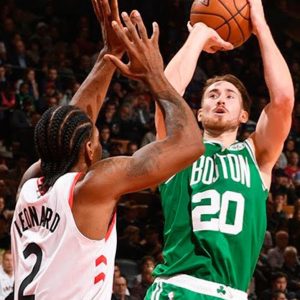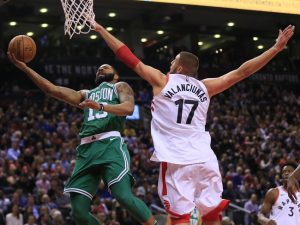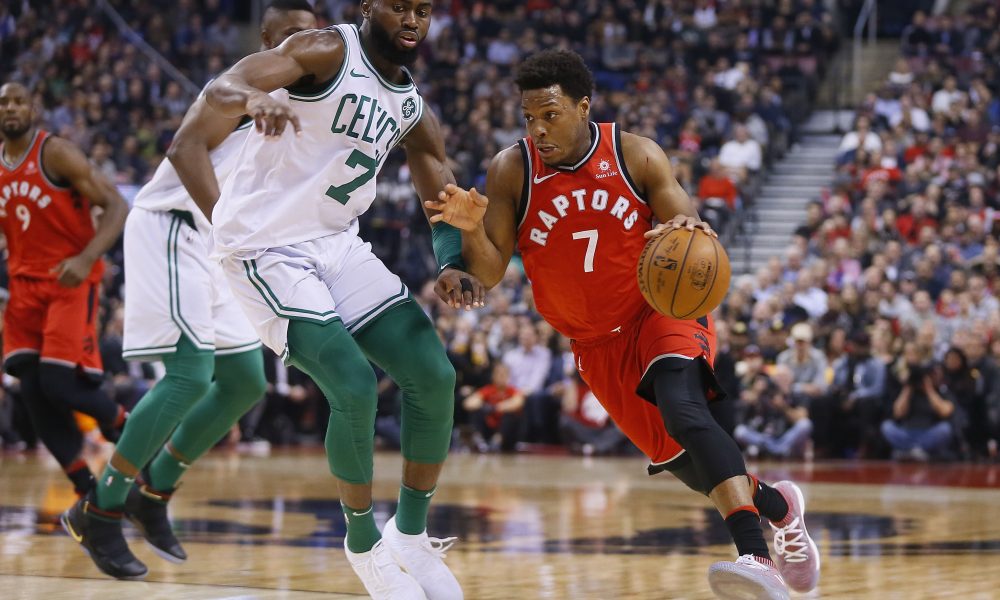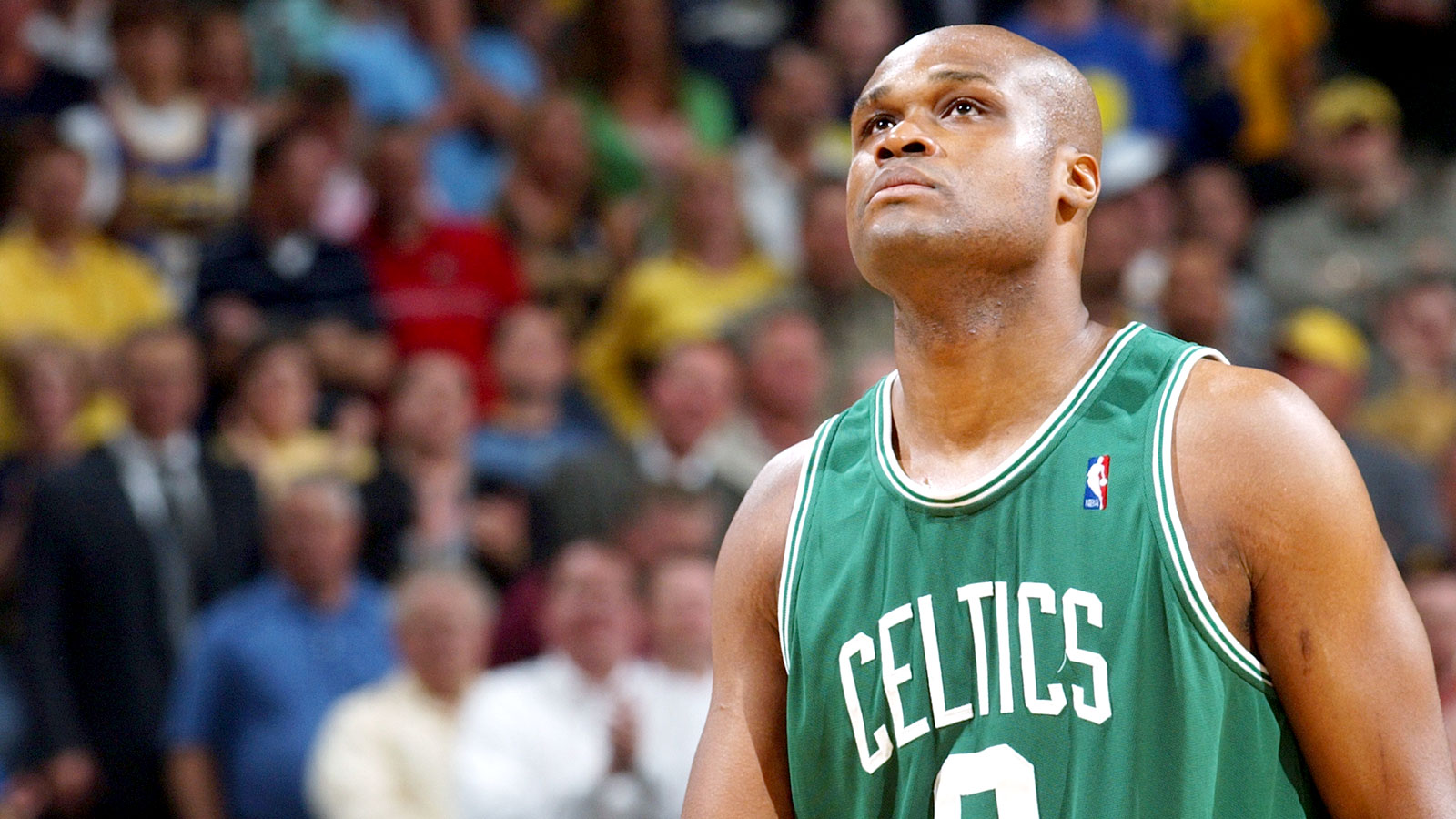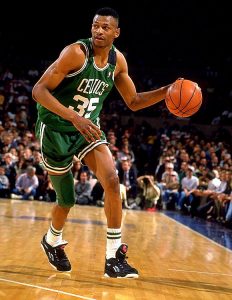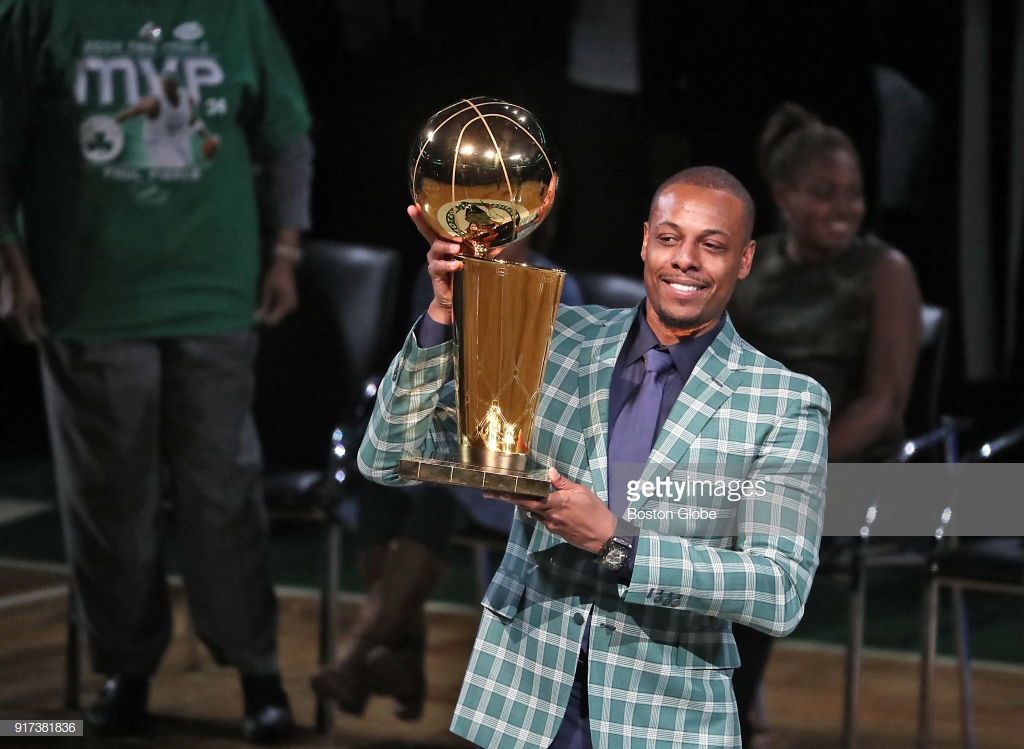Expectations are through the roof for the 2018-19 Boston Celtics. They have appeared in back-to-back Eastern Conference Finals, though both times falling short to LeBron James and the Cleveland Cavaliers.
With James moving to the Western Conference, as well as superstars Kyrie Irving and Gordon Hayward returning from injury, the Celtics are favored to reach the NBA Finals. That being said, lets compare the 2018-19 starters to the 2007-08 NBA Championship team to see if they have what it takes.
Point Guard – Kyrie Irving vs. Rajon Rondo
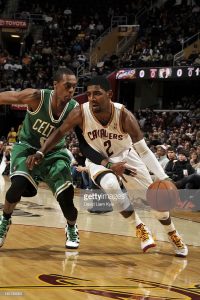
Kyrie Irving #2 of the Cleveland Cavaliers drives to the hoop against Rajon Rondo #9 of the Boston Celtics. (Photo by David Liam Kyle/NBAE via Getty Images)
Irving and Rondo have converse playing styles. Irving is a high volume efficient scorer, who takes about 20 shot attempts per 36-minutes. Whereas Rondo is a pure playmaker, who has led the league in assists three times since 2011-12.
Rondo was a perfect fit for the 2007-08 Celtics. His playmaking ability and defensive impact made him an ideal “true” point guard. Through 9 seasons in Boston, Rondo averaged 12.0 points, 9.3 assists and 4.3 rebounds, while having .127 win-shares per 48-minutes.
In contrast, Irving is the primary scorer as well as the primary playmaker. In his first season in Boston, he averaged 27.3 points, 5.7 assists and 4.2 rebounds, while having a win-shares per 48-minutes of .222. He may be the most talented guard in Celtics history and will surely have a major impact on the franchise.
Brown’s shooting was criticized early on. In his rookie season, he shot only 45 percent from the field and 34 percent from the 3-point line. In year two, Brown improved those numbers to 47 and 40 percent respectively. When comparing his first two seasons with Allen, the similarities between their per 36-minute statistics might shock you.
|
Name
|
G |
3PA |
3P% |
2PA |
2P% |
TRB |
AST |
STL |
PTS |
| Ray Allen |
164 |
4.1 |
.377 |
9.6 |
.451 |
4.5 |
3.5 |
1.2 |
16.7
|
| Jaylen Brown |
148 |
4.5 |
.379 |
8.1 |
.507 |
5.8 |
1.8 |
1.1 |
15.8
|
Per 36-minutes (first two seasons)
Through their first two seasons, Brown was a slightly more efficient shooter than Allen, but overall their statistics are remarkably similar. Making this comparison after Brown’s rookie season would have been insane, but after his sophomore campaign, I believe the comparison is warranted.
Also, the high-flying 21-year-old is a force on the defensive end. His 3.2 defensive win shares ranked fourth on the Celtics last season, ahead of defensive minded players like Marcus Smart (2.5), Aaron Baynes (2.5) and Marcus Morris (2.2). The emergence of Brown as a star should not surprise anyone, as he is capable of playing highly efficient and effective basketball on both ends of the court.
Allen played a pivotal role for the Celtics during their Championship run. Celtics fans can expect Brown to do the same.
Small Forward – Gordon Hayward vs. Paul Pierce
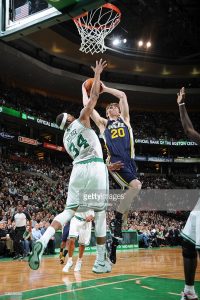
Gordon Hayward #20 of the Utah Jazz shoots against Paul Pierce #34 of the Boston Celtics. (Photo by Brian Babineau/NBAE via Getty Images)
The similarities between these two are uncanny, as well. Pierce stands in at 6-foot-7, weighing 235-pounds and Hayward at 6-foot-8, 225-pounds. Each of them are all-around players adept at padding the stats sheet. Both are versatile, capable of playing the wing, two-guard or primary ball handler roles effectively. From ages 24-26, the two players share a very similar stat line per 100 possessions.
| Name |
G |
3PA |
3P% |
2PA |
2P% |
TRB |
AST |
STL |
PTS |
ORtg |
DRtg |
| Paul Pierce |
241 |
7.1 |
.342 |
18.6 |
.451 |
9.1 |
5.6 |
2.3 |
33.0 |
105 |
100 |
| Gordon Hayward |
229 |
7.3 |
.370 |
15.3 |
.488 |
7.7 |
5.7 |
1.8 |
30.5 |
113 |
106 |
Per 100 Team Possessions (Ages 24-26)
According to the numbers, Hayward is more efficient and effective than Pierce on both sides of the floor. His all-around skill set will be key for Boston, as they pride themselves on versatility and efficiency.
Despite their difference in size, Garnett standing 6-foot-11, weighing 245-pounds, Tatum at 6-foot-8, weighing 225 pounds, I felt comparing the two would be fair as they both made their NBA debuts at 19-years-old, and are versatile on the offensive end.
Garnett began his career by receiving 1995-96 All-Rookie honors after averaging ten points, six rebounds, two steals and two blocks over 29-minutes per game. Tatum would have similar success, averaging 14 points, five rebounds, a steal and a block across about 31-minutes per game, while also receiving All-Rookie honors.
Garnett was one of the greatest defensive players of his generation. His nine All-Defensive First team honors are tied for most in NBA history. Despite the difference in their stature, Tatum possesses a similar defensive edge. In 2017-18, Tatum’s defensive win shares of 4.0 ranked first among Celtics players. His length and athleticism allow him to guard nearly every position on defense, which Garnett did seamlessly.
Back to the offensive side of the ball. Both Garnett and Tatum are capable shooters, although Tatum was significantly better in his rookie season. Each averaged over nine field goal attempts per game, although Tatum’s effective field goal percentage of .538 was significantly better than Garnett’s .497.
| Name |
Season |
FGA |
eFG |
TRB |
AST |
STL |
BLK |
PTS |
OWS |
DWS |
VORP |
| Kevin Garnett |
1995-96 |
11.5 |
.497 |
7.9 |
2.3 |
1.4 |
2.1 |
13.1 |
1.8 |
2.6 |
2.1 |
| Jayson Tatum |
2017-18 |
12.3 |
.538 |
5.9 |
1.9 |
1.2 |
0.9 |
16.4 |
3.0 |
4.0 |
1.8 |
Per 36-minutes (Rookie Season)
Overall, I believe Tatum will have a similar impact as Garnett on both sides of the floor, despite the differences in their size and play styles.
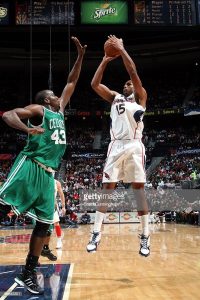
Al Horford #15 of the Atlanta Hawks shoots a jump shot against Kendrick Perkins #43 of the Boston Celtics. (Photo by Scott Cunningham/NBAE via Getty Images)
Once again, we have ourselves two opposite playing styles. Perkins was a bruiser in the paint, whereas Horford is used as a pivot atop the key.
Perkins acted as the team’s primary rebounder and rim protector in 2007-08. Since the team was filled with stars, he fit the enforcer role perfectly.
On the contrary, Horford is used as an offensive catalyst. The 32-year-old is one of the most versatile offensive big-men in the NBA. His ability to drive, post up, and shoot make him lethal on the pick-and-roll.
In 2017, he shot 43 percent from the 3-point line on a career high 97 3-point shot attempts. Also, his playmaking ability cannot be overlooked, as his 676 assists since 2016-17 rank second among big-men behind only Nikola Jokic (817).
Although he gets criticized for his inability to corral boards and block shots, it is clear Al Horford is an indispensable offensive cog in the machine that is the Boston Celtics.
Conclusion
After the analysis, it seems the 2018-19 Celtics roster rivals the talent of the 2007-08 Championship team. Only time will tell their fate, but fans will surely have an exciting season ahead.
